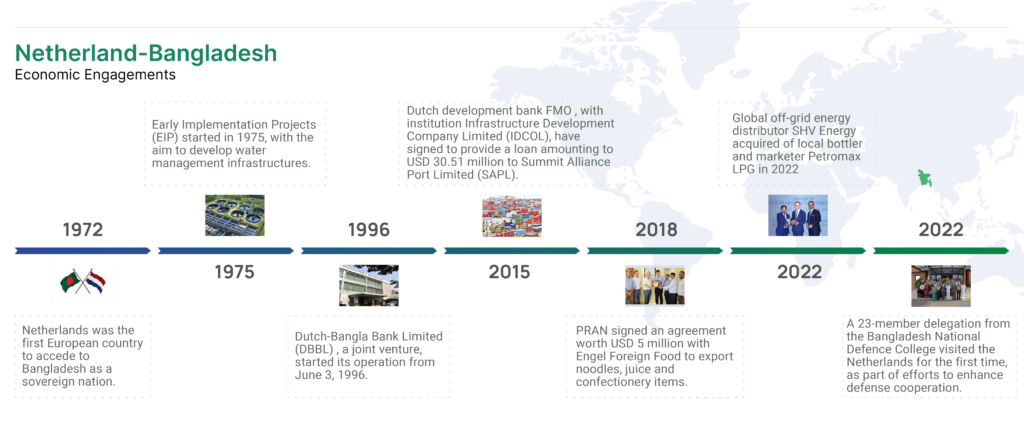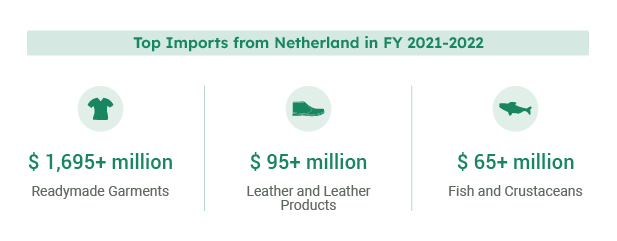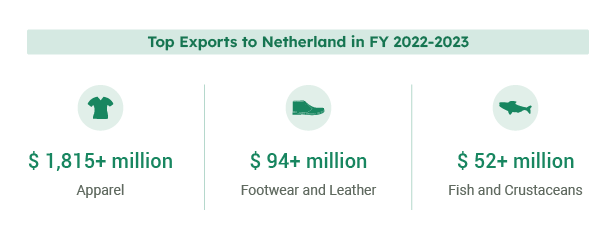The friendship between Bangladesh and the Netherlands is a remarkable example of a strong bond, and their partnership has its roots in the 1970s. This friendly relationship was established specifically in 1972, when the Netherlands became the first European nation to officially recognize Bangladesh as an independent country.
Since then, the Netherlands has been a significant partner in aiding the socio-economic progress of this relatively young nation. The collaboration between Bangladesh and the Netherlands initially began with the creation of water management systems in 1975 through the Early Implementation Projects (EIP). Apart from the Dutch government’s role as a development partner, private sector players have been investing in agribusiness, energy, water and maritime management.

In 2022, Bangladesh received a total of USD 3.47 billion in foreign direct investment (FDI), out of which USD 303.33 million, accounting for 8.70 percent, originated from the Netherlands. As of 2020, the Netherlands had surpassed China to become one of the leading sources of foreign direct investment in Bangladesh. This investment has been directed across various sectors in Bangladesh, with notable emphasis on electronics, information and communication technology (ICT), electricity generation, pharmaceuticals, agro-food, and the ready-made garment (RMG) and textiles industries, among others. Particularly in 2019, there was a significant increase in FDI from the Netherlands, with a prominent focus on the food and agriculture sectors.
The graph illustrating the FDI trends highlights the recent pattern of foreign direct investment exchanges between Bangladesh and the Netherlands. This trend signifies the continuous growth in trade between the two nations, with both sides experiencing an expansion in their trade activities. This strengthened partnership has been further facilitated by the implementation of open investment and business operation policies, which encompass aspects such as taxation, import tariffs, and the repatriation of capital, among other considerations.

Imports from the Netherlands totaled USD 200 million in 2022, with the primary imported commodities consisting of iron, organic chemicals, and machinery. Conversely, Bangladesh achieved exports amounting to USD 1.05 billion to the Netherlands in 2022. The leading exported items included ready-made garments (RMG), footwear, and crustaceans.

The notable increase in both export and import activities is driving enhanced innovation and a more strategic commitment. In the fiscal year 2019-2020, the Netherlands held the position of being the 9th largest recipient of Bangladeshi goods. Moreover, the relationship between the two countries has evolved over time, transitioning from a primary focus on developmental cooperation to a stronger emphasis on trade and investment. This shift has opened up opportunities for companies from both the Netherlands and Bangladesh to engage in business activities.

This partnership is further supported by the Government of Bangladesh (GoB), which has implemented lenient policies concerning investment and business operations. The Netherlands is among the 29 nations with which Bangladesh has established Bilateral Investment Treaties, a measure put in place since 1994. These treaties ensure safeguards against confiscation and typically encompass principles of non-discrimination, prompt and equitable compensation.
Furthermore, Bangladesh is a beneficiary of the European Union’s Generalized System of Preferences Plus (GSP+) initiative. Under this program, Bangladesh receives preferential entry into the EU market, which effectively extends to the Netherlands, for a range of exports, including textiles and garments. In addition, the Bangladeshi government offers a tax exemption period lasting five to seven years to international investors aiming to operate within specific sectors. For investments in certain priority areas like power, tax exemption can be extended for as long as 15 years.
Contact us for a comprehensive understanding of the investment landscape in Bangladesh